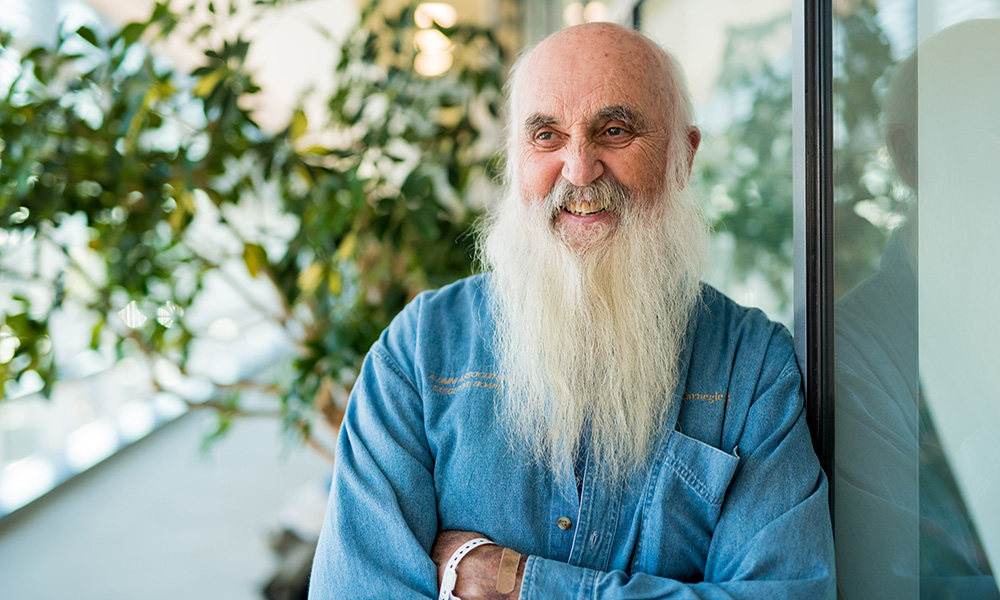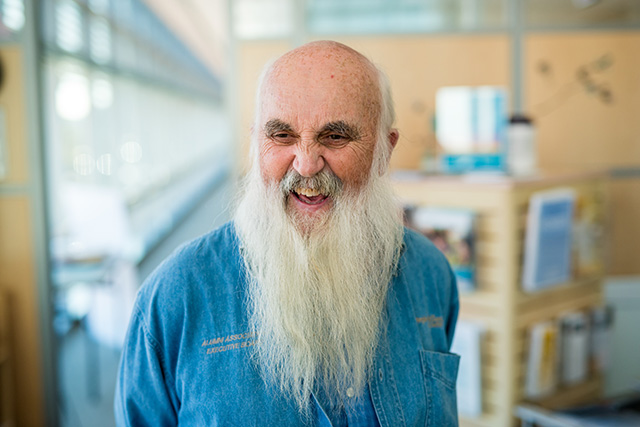Patient StoryFeb | 24 | 2017
Bill McKay


The Cancer Center’s Story Project is an effort to capture stories from our community of patients, friends, family, clinicians, and staff who have been affected by cancer in some way. This is Bill's Story.
- Bill McKay is an incredibly active, nearly 70-year-old, who lives life to its fullest with his wife, children, and grandchildren.
- "[My grandchildren] will remember that a person with COPD for 8 years, multiple myeloma for 2, can still climb ladders, lift weight, anticipate and avoid danger and help them learn every facet of building a home for themselves someday."

"Winter 2014 was a normal one for me: 67 years old, retired and very active. All my life, I did everything for myself and family of 7: built our house in Mashpee, did solar in the 70s; ran marathons, sailed boats over 100 times a year, cut and split wood for heat, played hockey, skied New Hampshire and tried everything else that came along."
"I have a huge, fun and supportive family: wife, 5 children, 5 great spouses and 11 grandchildren. It is NOT hard to be sick when there are so many good things going on with these people. And then in March, a week after 5 days of cross country and downhill on beautiful snow, my arms hurt. “Just tweaked something, I guess?” I have never injured myself in any activities; I was not worried. Five days later, when the max of Advil was doing nothing and the arms were getting worse, Moe (my wife) told me to get to our primary care doctor and have him check it out."
"It took my doctor no time to realize there was something going on in the upper vertebrae of my neck; an MRI showed a mass and a fair amount of my 6th vertebra gone. This was NOT good; I was put in a neck brace, hauled into an ambulance and rushed to MGH."
Experience at Mass General
"My blood pressure upon arrival was 250 over 120 (though I felt no headache or anything). Their triage team was great. In no time, I was in a room on the neurology floor and actually pretty interested in all that was happening. I was stable, and the doctors said they would work on the tumor, the vertebra and with oncology try to figure out where it came from. It was a large team of really smart and really caring professionals. I am an optimist; at no time was I even worried – I remember being just as interested in the menu for the “free” dinner I was to receive."
"Anyway, within a few days, Dr. Shin, one of the best neuro-surgeons in the world, and his team did part one of their plan: Enter the neck from the front, cut out as much of the tumor as possible, and build a new vertebra by screwing in titanium rods and mesh filled with cement. He told me that they may have to roll me over and go in from the back too... they would have to see what was up when they got in there. I was very relaxed and happy to have this team do whatever they needed to do."

"And, in five hours, I woke up, was very happy to wiggle my toes and fingers and of course looking forward to dinner again. The operation was a success and now I was oncology’s property as the cancer had to come from somewhere. It took longer than they thought to find the source. 'Bill, there is good and bad news. Bad, you have cancer; good, it is a good cancer. Multiple myeloma (MM) is the cause of the tumor and it is a cancer inside your bones, in the marrow. We can treat it, knock it way down, stop it for a while from deteriorating your bones, and we are coming up with new treatments rapidly. You will have it for life; but the life will NOT be short.'"
"If you get those words and you are 40... well, it would be difficult to feel too great; getting that message at near 68 years old was not too bad at all. They were telling me that there is treatment and it can be controlled for a period. Very good!"
"That day, I met MGH’s expert on MM, Elizabeth O’Donnell, who was another very smart, caring and honest doctor. She outlined two treatments: radiation/chemo at a reduced amount for life.... or a stem cell removal and replacement which was more intense but promised longer times between re-occurrences of the cancer (I was a bit over the age limit for that, but it was there if my wife and I wanted to go that way.)"
"We chose the former and after 8 days in MGH, I said goodbye to the excellent staff on the neuro floor and headed south to Cape Cod. It was wonderful that MGH cooperates with local treatment centers so that patients can get treatments near home."
Life After Diagnosis
"For 3 months, I had to wear a neck brace until the repairs to the spinal column were healed. That was difficult as I was told NOT to lift over 5 lbs. etc. So my muscles turned to mush and I was very weak. This inactivity really had a much larger effect on me than either radiation or chemo. Interesting."
"During this time I had a dozen or so radiations by Dr. Canaday of Falmouth. The staff was great, Dr. was a hockey player, and we even had a little celebration / confetti throwing when I graduated. Bringing home the mask used to hold me on the table was a great idea; two of the grandkids decorated it for me to use on Halloween. It is important to find the positive in such things, eh?"
"A few weeks later I was ready for my first week of chemo; that did not go well. I got major infections in my right foot and inside my mouth. It took 2 hours to eat a simple meal, but what the heck, I wasn’t able to do much then anyway. And it was fun to have my little wife pushing me up and down Beacon Hill in a wheelchair. One week later, my body adjusted and for the next 8 months, I had no discomfort with the chemo and the other 21 pills a day which kept me balanced. My blood tests showed excellent blood work and lowering of the myeloma numbers."
"About a year after my diagnosis, everything looked like it was down to a manageable level, so Dr. O’Donnell put me on a maintenance regimen 4 times a year to help my bones get stronger. This regimen will continue for life or at least until new treatments for MM are discovered."
"During these times, I also needed physical therapy to strengthen the disappeared muscles in the lower lumbar region and compression fractures in my thoracic area. I do these faithfully now, a year later, and have added much daily exercise. I am on my feet for 8 hours a day at least: painting, building projects, maintenance, preparing firewood, cross country skiing, boat repair... just about everything I did before I got sick. I have given up ice skating and splitting wood; I had to sell a large sailboat because of its physical requirements. I became a motor-boater... something most sailors will NOT admit to. I also had some early morning time (I sleep a bit less than before) to write a historical novel about our town, set in the mid-19th century, and featuring an Irish immigrant and a Wampanoag boy."
"I do extra exercise: run 2 miles, three times a week; ride an exercycle for 30 minutes, four times a week; row a dory for 2 miles, three times a week. Two times since my diagnosis, I have run a 7 mile, Falmouth Road Race (slowly and surely) just so as NOT to break my 38 straight year of running in this fun event. Nearing 70, I still feel my body increasing in strength. But I am very careful in all activities; I tell myself 75% speed, focus, be defensive, assume you are going to fall down at any time. This works."
Random Thoughts That Have Helped Me
"I do not focus on MM. I have never looked it up online, I do not read about it. I have no idea how one dies from it. One might say, “Ignorance is bliss.” The doctors and my wife can think about it and tell me what to do or NOT to do. I will faithfully obey them; trust is a very good therapy."
"I do treat the disease as a teachable moment... indeed MANY teachable moments, If one dies at sea; disappears over the edge, unprepared and leaving no goodbyes... what is good about that? When you have an idea about when your time will be up, it can really be a positive. You appreciate little things a lot more. Fewer things bother you; you really can mellow out and be quite comfortable. I have 5 kids, 11 grandkids and a lot of other friends having lived in a small town, Mashpee, for all of my adult life. It is fun to put them at ease when they are sad for me. It is great to joke around about losing 5 inches of height in a few years. As they fatten up while I lose 40 lbs., it is great to recommend my 'great but unintended' diet regimen."

"My grandchildren are very close to me; this is another advantage of being sick. They are seeing first hand one way to deal with terminal illness. They are very aware, very curious and hopefully learning lessons that will be with them for life. All of them suggested we build a tree house a few months ago. That may seem mundane, but with all of them contributing, we finished it a few weeks ago."
"We are very proud of it. And they will remember that a person with COPD for 8 years, multiple myeloma for two, can still climb ladders, lift weight, anticipate and avoid danger and help them learn every facet of building a home for themselves someday."
"So in closing, this story will not be ending in the near future. I am getting stronger, have new things to try, am tolerant of my drugs and will so be with the next ones that have to be used."
"This March will be two years since Mass General Hospital saved me and gave me a considerably longer life. MM will come back; other unexpected illnesses may be ahead for me. Of one thing I am certain: MGH will figure it all out and give a great shot at more adventures and happy times."
Bill McKay[My grandchildren] will remember that a person with COPD for 8 years, multiple myeloma for 2, can still climb ladders, lift weight, anticipate and avoid danger and help them learn every facet of building a home for themselves someday.
This interview was conducted in October 2016 and has been edited for clarity.
Related Programs
Type
Centers and Departments
Topics
Patient Stories
View inspiring cancer survivor stories from Mass General Brigham Cancer Institute’s community of patients, families, and staff.
Supportive Care Services
Our support programs can help patients and their families cope with the challenges of a cancer diagnosis.
